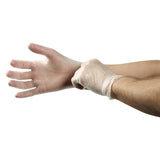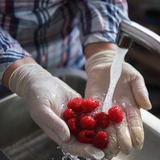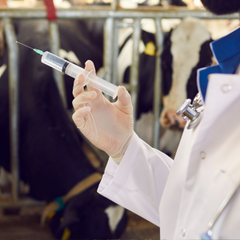
Everything You Need to Know About Vinyl Gloves
Vinyl gloves, often overshadowed by their nitrile and latex counterparts, have their own set of unique qualities that make them valuable in various settings. In this comprehensive guide, we'll uncover everything you need to know about vinyl gloves – from their composition and uses to their advantages and potential drawbacks. Whether you're a healthcare professional, a food industry worker, or simply exploring glove options for everyday tasks, join us as we navigate through the diverse world of vinyl gloves, shedding light on their characteristics, benefits, and how to make informed choices when incorporating them into your daily routines.
What are Vinyl Gloves?

Vinyl gloves are an economical type of disposable gloves that feature a more durable design than poly gloves, and are a great latex-free option to help prevent allergies or sensitivities. Cost-effective, they are designed for quick tasks and allow for the easy removal and replacement of gloves in busy medical, food service, or industrial locations. Vinyl gloves feature a more form fitting design than poly gloves and have beaded cuffs to ensure a comfortable fit.
What are Vinyl Gloves Made of?
Vinyl gloves are made from polyvinyl chloride (PVC) which is a thermoplastic polymer. This versatile polymer provides a cost-effective alternative to latex and nitrile, making vinyl gloves a popular choice across various industries. Some types of vinyl gloves have more stretch and a higher tensile strength, these are generally classified as synthetic vinyl gloves. Similar to regular vinyl gloves, they are a great alternative to latex for lower risk tasks.
How are Vinyl Gloves Made?
Vinyl gloves are manufactured through a process that involves the polymerization of vinyl chloride monomers. The polymerization transforms these monomers into polyvinyl chloride (PVC), the primary material used in vinyl glove production. The manufacturing process typically begins with the creation of a PVC resin, which is then mixed with plasticizers to enhance flexibility. The resulting mixture undergoes heating and cooling processes, followed by dipping or molding to shape the gloves. This production method allows for the creation of a versatile, cost-effective, and latex-free glove option that finds applications across a wide range of industries, from healthcare to food service.
Advantages of Vinyl Gloves
In the world of disposable gloves, vinyl emerges as a versatile and cost-effective option, often overshadowed by its counterparts. This table highlights key advantages of vinyl gloves, from their affordability and latex-free nature to the smooth surface that enhances user experience. Understanding these characteristics sheds light on why vinyl gloves are a preferred choice in various industries.
| Characteristic | Description |
|---|---|
| Affordability | Vinyl gloves are generally more cost-effective compared to latex or nitrile options, making them a budget-friendly choice for various industries. |
| Latex-Free | Vinyl gloves are latex-free, making them a great alternative for people with latex allergies or sensitivities, ensuring broader accessibility. |
| Smooth Surface | The smooth texture of vinyl gloves makes them easy to put on and pull off, reducing the risk of tearing and enhancing user comfort during extended wear. |
| Comfortable Fit | Vinyl gloves provide a comfortable fit, ensuring ease of movement and reduced hand fatigue during prolonged use. |
| Versatility | These gloves find applications across various industries due to their versatility, offering reliable protection for tasks ranging from healthcare to sanitation to food service. |
Are Vinyl Gloves Latex Free?
One of the most common questions we get about vinyl gloves is "do vinyl gloves contain latex?" - luckily the answer is no, vinyl gloves are renowned for being latex-free. This feature makes vinyl gloves an indispensable option for individuals with latex allergies or sensitivities, ensuring a broader spectrum of people can safely use them. By eliminating the risk of latex allergic reactions, vinyl gloves become an inclusive choice across various industries, providing a reliable barrier without compromising on safety or comfort for those who may be sensitive to latex materials. Keep in mind there are still some people with a vinyl glove allergy though it's incredibly uncommon, if that's the case we recommend looking for an accelerator-free nitrile gloves like our Grape Grip.
Are Vinyl Gloves Food Safe?

Another question we see a lot is: "can you use vinyl gloves for food prep?" and "can I use vinyl gloves for cooking?" Yes! Vinyl gloves are a food-safe choice and are widely used in the food service industry. These gloves meet the necessary standards for contact with food, making them suitable for tasks such as food prep, cooking, packaging, and serving. When it comes to working with food we suggest you get your vinyl gloves powder free. Vinyl disposable gloves offer a protective barrier against contaminants and are often chosen for their cost-effectiveness and versatility in food-related spaces.
Are Vinyl Gloves Safe for Medical Use?
Vinyl synthetic exam gloves are commonly used in medical settings and are considered safe for certain medical applications - as long as you're using exam grade gloves. They provide a reliable barrier against contaminants and are often chosen for tasks that do not involve high-risk exposure to infectious materials. Since vinyl gloves are latex-free, they're a great option in healthcare settings to protect staff and patients with latex allergies. Vinyl gloves do not offer the same level of chemical resistance and durability as nitrile or latex gloves. Therefore, the appropriateness of vinyl gloves for medical use depends on the specific requirements of the task and the associated risk factors.
Are Disposable Vinyl Gloves Recyclable?
No. The majority of recycling facilities do not accept vinyl gloves due to their composition, which includes polyvinyl chloride (PVC). PVC is known to be less environmentally friendly and more challenging to recycle compared to other materials. As a result, proper disposal methods, such as following guidelines for medical or hazardous waste, should be adhered to when dealing with used vinyl gloves. Exploring alternative glove materials that are more recyclable may be considered for those aiming to reduce environmental impact. To learn more about which gloves are recyclable check out our blog post on the topic: Are Disposable Gloves Recyclable.
How to Choose the best Vinyl Glove for the Job
Navigating the diverse landscape of vinyl gloves involves more than just understanding their composition and applications. To make informed choices that align with specific tasks and preferences, it's crucial to delve into the nuances of glove selection. In this section, we will explore key considerations when choosing the best vinyl gloves for the job. From understanding different glove grades to weighing the benefits of thick versus thin options, and deciphering the nuances between powdered and powder-free gloves, we aim to provide a comprehensive guide to empower individuals in making optimal decisions based on their unique needs and requirements.
Glove Grades

Understanding their grades is pivotal in choosing the right glove for a specific task. The classification of vinyl gloves into medical, industrial, and food grades reflects their intended use and performance standards. In this section, we will unravel the distinctions between these grades, shedding light on the unique features and suitability of each, enabling you to make informed decisions tailored to the demands of medical, industrial, or food-related uses.
Medical Grade
Medical grade Chameleon and Sensi-Flex vinyl gloves are both powder-free and suitable for use during medical examinations or procedures. Our Chameleon and Sensi-Flex vinyl exam gloves are non-sterile, which means they can only be used for non-surgical procedures.
Industrial Grade
Industrial grade Anchor, Verge, Gladiator, and Odyssey gloves are available in lightly powdered or powder-free styles. Most of our options are clear vinyl gloves but we also have a blue vinyl glove. All of our vinyl gloves are perfect for performing general cleaning or maintenance tasks such as cleaning tabletops, and can protect against mild irritants.
Foodservice Grade
All of our vinyl gloves are FDA approved for food use which makes them a great choice for food prep, cooking and packaging at any foodservice business.
Thick vs Thin Vinyl Gloves
The choice between thick and thin vinyl gloves hinges on the specific demands of the task at hand. Thick vinyl gloves are prized for their enhanced durability and resistance, making them suitable for tasks requiring prolonged wear and exposure to potential hazards. On the other hand, thin vinyl gloves offer increased tactile sensitivity and flexibility, making them ideal for delicate procedures and applications where precise dexterity is crucial. The decision between thick and thin gloves ultimately rests on striking a balance between the level of protection required and the need for optimal hand movement and sensitivity in a given context.
Powdered vs Powder Free vinyl Gloves
Choosing between powdered and powder free vinyl gloves involves considering factors that align with the specific task at hand. Powdered vinyl gloves are often preferred for their ease of donning and reduced friction, making them an excellent choice for tasks requiring quick glove changes, or for users with sweaty or damp hands. However, in environments where powder may pose contamination concerns, such as food preparation or certain medical applications, powder-free vinyl gloves are the go-to option. The decision between the two hinges on the user's preferences, the nature of the task, and the necessity for a pristine, powder-free environment, ensuring that the choice of gloves complements the requirements of the intended application.
Vinyl Gloves Chemical Resistance
Vinyl disposable gloves offer moderate chemical resistance, making them suitable for a range of applications. While not as chemically resistant as nitrile gloves, vinyl gloves provide a protective barrier against many common chemicals. They are particularly adept at handling mild irritants and are widely used in industries such as food service, where resistance to certain chemicals is essential. However, it's crucial to note that vinyl gloves may not be the best choice for tasks involving exposure to harsh chemicals or solvents, where gloves with superior chemical resistance, such as nitrile, would be more appropriate. Understanding the specific chemical demands of the task is essential in determining the effectiveness of vinyl gloves in providing the necessary protection. If you're going to be using chemicals we always recommend checking our Disposable Glove Chemical Resistance Chart to ensure you're making a safe choice!
Wrapping Up with Vinyl
As we conclude this journey through the diverse world of vinyl gloves, armed with insights into their composition, applications, and the nuances of selection, you're now well-equipped to make informed choices tailored to your unique needs. From understanding the significance of different grades to weighing the benefits of thickness and the choice between powdered and powder-free options, this comprehensive guide has covered it all. GloveNation’s vinyl gloves provide a quality fit and design without the hefty cost to keep medical, industrial, and food service locations running smoothly and safely. Consider this your final glove salute, as you step forward confidently into tasks, armed with the wisdom of vinyl glove mastery
Check out our selection of Vinyl Gloves
Shop these categories:






